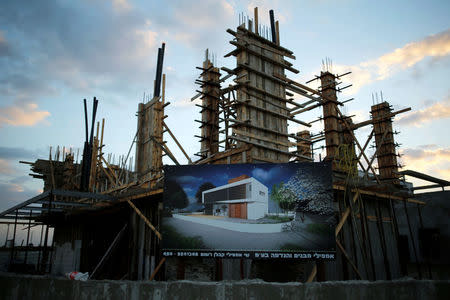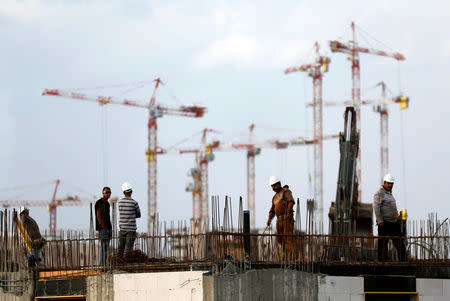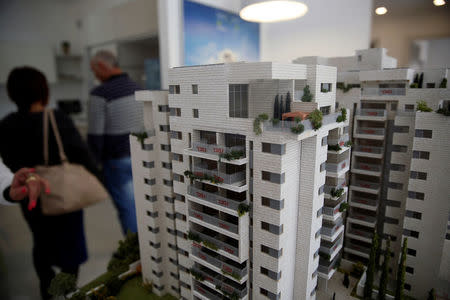Israel's finance chief faces a 10-year scourge: soaring house prices
By Steven Scheer JERUSALEM (Reuters) - On the campaign trail in early 2015, rising politician Moshe Kahlon promised to do what none of his predecessors had managed: rein in Israel's soaring housing costs and put the dream of owning a home back within reach. With home ownership among young married couples shrinking rapidly -- figures show a 30 percent decline among 25- to 30-year-olds over the past decade -- Kahlon's message resonated. His party, formed only months before the election, won 10 seats in the 120-seat parliament and became the junior partner in Prime Minister Benjamin Netanyahu's coalition. Kahlon was named finance minister. Expectations rose. But since taking office, he has made little headway on his core promise. House prices have risen a further 10 percent, to record highs. Kahlon, who declined to comment for this article, has warned of a destablising bubble. Many couples can no longer afford the minimum 25 percent down-payment on a home, forcing them to rent. As a result, rental costs have soared, particularly in cities like Tel Aviv. With average household incomes at around 10,000 shekels a month ($2,600), some are spending half their earnings on rent. "That's why so many couples in Israel are frustrated and say the economy offers no future for them," said Eitan Regev, senior researcher at the Taub Center for Social Policy Studies. Like his predecessors, Kahlon has tried to chip away at the problem, proposing tax breaks and subsidies for some buyers. Analysts say his quick-fix approach is typical, "because they don't know how long they'll be in office," said Dan Ben-David, head of the Shoresh Institution for Socioeconomic Research. But two fundamental problems remain. One is soaring demand, the second is lagging supply. Besides the typical need for housing, demand is soaring because real estate is a good investment - the Tel Aviv Stock Exchange's broad TA-100 index is down 5 percent this year and was down 2 percent in 2015, making the returns from real estate enticing. At the same time, supply is lacking. Experts estimate a shortfall of as much as 100,000 units. Housing starts have begun to increase to a level reflecting the country's rapidly growing population, but it could be years until enough new houses are built to reverse the trend. "The response to the increase in home prices by increasing building starts was very slow," Bank of Israel Governor Karnit Flug said this week. "Only in recent years have we seen an increase in building starts to the level that we believe is more or less in line with current demographic needs." NIGHTMARE TO BUILD An index compiled by the Organisation of Economic Cooperation and Development, a club of developed countries, shows Israel now has the highest nominal house prices of all 35 members apart from Turkey. Since 2007, prices have doubled while wages have remained below the OECD average. Some of the demand comes from wealthy Jews from the United States, France, Britain and beyond who want to own property in the Holy Land that they only use a few times a year. They snap up seafront properties but don't rent them out, fuelling both the house-price boom and the rental shortage. Building more homes is the fundamental solution, and Israel has shown it is capable of doing that rapidly in settlements in the occupied West Bank. But doing so in Israel itself is much harder. The state owns most of the land, and bureaucracy means it can take up to 13 years from the start of planning to completion. Many municipalities prefer to build shopping centres rather than new neighbourhoods that require costly services. Kahlon has tried to consolidate the various housing agencies to cut the red tape. He has also begun a programme to give developers a discount on buying land while subsidizing some home buyers. His latest plan is more controversial: taxing those who own at least three homes, hoping they will sell and increase supply. Many landlords say they won't sell -- they'll just pass on any extra costs to tenants via higher rent. "The impact on house prices will be very close to zero," said Michael Sarel of the Kohelet Economic Forum, a think tank. If landlords do sell, "demand will increase because all the people who live in the apartments will have to buy their own apartments," said Sarel, a former finance ministry economist. In a speech last week, Kahlon acknowledged the housing crisis still lacked a lasting solution. "We didn't create it," he said. "Me and my team came here to solve it." And he offered another cautious commitment. "I am trying to stop the rising prices. But this will come." (Editing by Luke Baker, Larry King)

 Yahoo News
Yahoo News 









